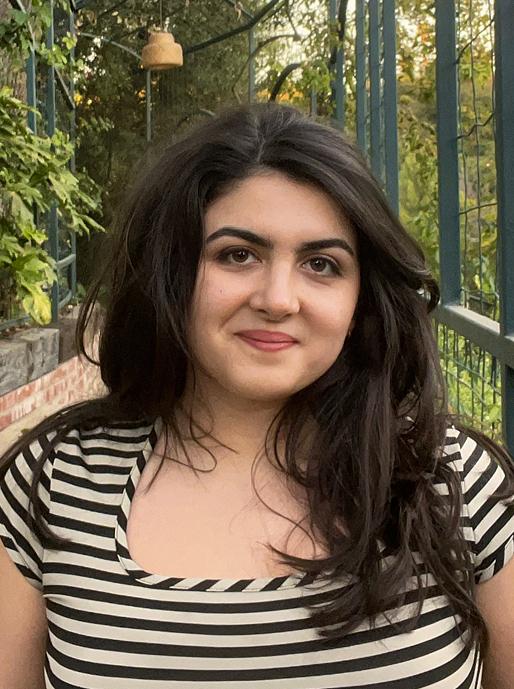
Meet Sophie Levy, a Research Fellow in our Museum Department. Sophie recently joined our team and sat down with us to discuss some of her interests and tell us a little more about her work as the Nazarian Research Fellow in Persian Jewish Art, Culture, and History here at the Skirball Cultural Center.
Q: Tell us about a past or present exhibition that you enjoyed and why.
A: Since starting my fellowship, I've learned a lot from my colleagues about RECLAIMED: A Family Painting (on view from October 2023 to February 2024), a temporary exhibition curated by my supervisor, Alissa Schapiro. The exhibition told the story of a Jewish family in Czechoslovakia and a Baroque painting that belonged to them, which was stolen by the Nazis and eventually recovered decades later. I was living in New York at the time so I unfortunately couldn't see the show in person, but I've since looked into its content. Beyond highlighting the central painting, RECLAIMED also foregrounded the object's history and brought it to life, lending a meaningful role to contextual objects like the Bloch family's letters, suitcases, and a reconstruction of their living room. Since I'll be working with objects that belonged to exiled Iranian Jewish families, this exhibition has stayed with me as a powerful example of how museums can honor displaced histories in a transparent, sophisticated way and invite us to see that objects can hold entire worlds within them.
Q: Describe a Skirball event you had the opportunity to attend. What made it special for you?
A: On December 3, I got the chance to attend the reception for the 2024 Howard I. Friedman Memorial Graduate Essay Prize. Alona Bach discussed her winning essay, “Electric Yiddishkeit,” and Sophia Shoulson, the runner-up, talked about her work on Yiddish print culture. It was a really warm, sweet, and happy occasion all around, and I learned so much from Alona and Sophia. I had a great time chatting with them and other Skirball community members about Jewish languages, the history and politics of Jewish assimilation in America, and lots of other interests we had in common.
Q: What's one activity you prioritize outside of the Skirball? How does it interact with the work you do here?
A: Outside of my work at the Skirball, I'm also a freelance editor and fact-checker. Recently, I've worked on several projects focused the history of ethnoreligious minorities in the Ottoman Empire and Türkiye, which has added whole new dimensions to how I understand my own research on Iranian Jewish material culture and history. I'm also a very, very mediocre classical piano player and I have a background in drawing, painting, and language learning. It's a nice surprise to see how these things all feed into each other so organically now that I'm working in a museum setting and trying to tell cohesive stories through a wide range of media.
Q: Tell us about a coworker who has gone above and beyond to represent the Skirball in their work.
A: It's hard to pick just one coworker, because the Skirball's Museum Department is full of gems and I feel lucky to work alongside all of them—our curators, administrators, registrars, and collections documentation team. But I'm especially grateful for my supervisors, Alissa Schapiro, our Associate Curator and Collections Specialist, and our Museum Director, Sheri Bernstein. I learn from their perceptiveness, their scholarly knowledge, their tact, their balance of determination and flexibility, and their honest commitment to the Skirball's values every day.
Q: What are you looking forward to learning more about yourself in the following year?
A: This fellowship has enabled and will continue to push me to hone a lot of professional skills, from writing to concept development to creating healthy relationships with collectors, donors, and colleagues at the Skirball and other institutions. It feels very valuable to have experiences that both encourage my strengths and clearly point out to me the ways that I can improve. I also think this fellowship is an opportunity for me to engage and relate to the wider Iranian Jewish community that I'm a part of in new and interesting ways, both personally and on behalf of the Skirball. I'm sure that forging new bonds on that front will teach me a lot about myself, but I'm much more curious what I'll learn about the people, families, and objects I'll encounter along the way.
We want to extend our thanks to Sophie for her contributions and are thrilled to have her help grow our celebration of Persian Jewish culture here at the Skirball. Through partnerships like this, we deepen our connection to Jewish identity, its diaspora, and the broader world around us.
About Skirballer Spotlights
Our institution is more than just a workplace—it's a community where each team member plays a vital role in bringing the Skirball's mission and values to life, and creating memorable experiences for all who walk through our doors. As a loving tribute to our original benefactors, Jack and Audrey Skirball, and because of the Skirballs' dedication to education and cultural exchange, we proudly call ourselves "Skirballers."
We regularly spotlight one of these Skirballers, showcasing their unique talents, passions, and contributions to our community. Through these introductions, we invite you to get to know the people who make working here truly something special.